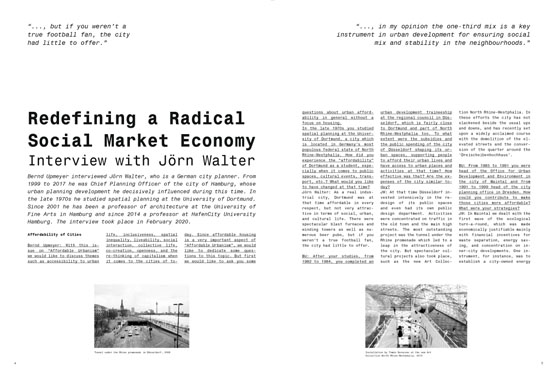27-02-20 // REDEFINING A RADICAL SOCIAL MARKET ECONOMY – INTERVIEW WITH JÖRN WALTER

Redefining a Radical Social Market Economy – Interview with Jörn Walter, p. 4-5
Bernd Upmeyer interviewed Jörn Walter, who is a German city planner. From 1999 to 2017 he was Chief Planning Officer of the city of Hamburg, whose urban planning development he decisively influenced during this time. In the late 1970s he studied spatial planning at the University of Dortmund. Since 2001 he has been a professor of architecture at the University of Fine Arts in Hamburg and since 2014 a professor at HafenCity University Hamburg. The interview took place in February 2020.
[…]
BU: Recent and current protests around the world addressing economic justice, such as the French yellow-vest movement that was motivated by rising fuel prices and the high cost of living, or the current Chilean protests against rising fares on public transit that triggered the biggest demonstration the country has ever seen, are proof of the urgency of finding new and innovative solutions to produce more “Affordable Urbanism”. Do you think that we have to re-think capitalism when it comes to the cities of today?
JW: Fact is that since the liberalisation and globalisation of markets in the 1980s, there has been a growing gap between rich and poor worldwide. Since the 2009 financial crisis, the redistribution of wealth has not only affected the capital, financial, and industrial markets, but also massively captured the real estate markets, which has been mirrored in rapid increases in land prices and rents. This is the reason for the social counter-movements all over the world, which relate to affordable living conditions, fairer distribution of wealth and, with the “Recht auf Stadt” movement, also to affordable housing, commercial, social and cultural space and transport costs. In other words, an affordable city. Since all planned economy counter-models failed in the 20th century, we should recall those of a radical social market economy, which were very successful in the USA since the New Deal in the 1930s and in Europe since the post-war period with the welfare state models up to the 1970s. At its core, the state has ensured a more equitable distribution of income and wealth through a variety of interventions, taxes and subsidies, resulting in a socially much more balanced and affordable supply situation. This is still necessary and overdue today.
BU: Many countries, especially in the Western World, are trying increasingly to make their cities more environmentally sustainable, which is certainly a great thing. However, more environmentally sustainable buildings or neighbourhoods are usually more expensive to build than less sustainable ones, which might challenge therefore the creation of more affordable cities in the future. How do you see that?
JW: This is certainly a conflict of objectives that – among others – cannot be ignored. It does not make the specific objectives wrong, but it is clear that optimization is only possible in the sense of a comprehensive sustainability concept that takes ecological objectives just as seriously as social and economic ones. In this respect, some ambitious building-related energy targets are questionable from an economic and social point of view in terms of investment and operating costs. In order to achieve more compatible solutions, the focus nowadays is, for example, rightly directed away from the building to the neighbourhood. The decisive question is always: with which measures do we achieve the greatest effects in terms of a comprehensive sustainability concept…
… the complete interview was published in MONU #32 on the topic of Affordable Urbanism on April 20, 2020.
Title: Redefining a Radical Social Market Economy
Project: Interview with Jörn Walter
Date: February 2020
Type: Commissioned interview
Topic: Affordable Urbanism
Organizer: MONU
Status: Published
Publications: MONU #32, P. 4-11
Interviewer: Bernd Upmeyer